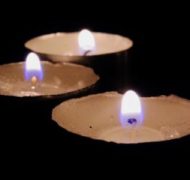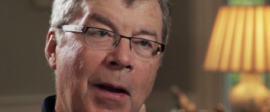Best of Daily Reflections: How Should We Expose the Deeds of Darkness? Part 2
Daily Reflection / Produced by The High Calling
...It is shameful even to mention what the disobedient do in secret. But everything exposed by the light becomes visible—and everything that is illuminated becomes a light. This is why it is said: "Wake up, sleeper, rise from the dead, and Christ will shine on you."
Ephesians 5:11-14
In yesterday's reflection, we saw that Ephesians 5:11 tells us to avoid partnership with "the fruitless deeds of darkness, but rather expose them." These deeds of darkness are primarily those done by people who live outside of the light of Christ, people whom Ephesians calls "Gentiles." Once we were Gentiles living in darkness. But, we who have become children of light through Christ are now to expose the deeds done by those living in darkness.
Many Christians across the theological and political spectrum understand this to mean they are to publicly announce and rebuke what they believe to be the dark deeds of others. For those on the more conservative end of the spectrum, this often means denouncing "godless Hollywood" or inveighing against sins associated with sexuality. More progressive Christians "speak truth to power" by condemning corporate greed or opposing U.S. military policy. Many Christians, no matter their ideological leanings, indulge in criticism of the moral failings of their family members or neighbors. In these ways and others, we who are light see ourselves as exposing the deeds of darkness.
Though one might try to construct a biblical case for the kind of pronouncements I have mentioned here, Ephesians 5:11 should not be part of that case. This passage, I believe, does not tell us to expose the dark deeds of others by publicly denouncing them. In fact, the very next verse notes, "It is shameful even to mention what the disobedient do in secret" (5:12). So it seems unlikely that Paul wants us to expose these secret deeds by mentioning them out loud. He must have another sense of "expose" in mind.
In tomorrow's reflection, I will scrutinize more deeply the meaning of "expose" in Ephesians 5:11. As I bring today's reflection to a close, I want to raise the possibility that we expose deeds of darkness, not so much by denouncing them as by letting the light of God shine in and through us. We do this by announcing the good news of God's grace in Christ and by living in such a way that our light can be seen by others. The "fruit of the light," after all, is to be found in "all goodness, righteousness and truth" (5:9). It is not found in mentioning the shameful sins of others. So, even if there is a time for us to denounce the darkness in the world, our main task as children of light is to let the light of Christ shine in our words and deeds. We are to live in such a way that deeds of darkness are seen to be fruitless in comparison to the abundant fruit of light that grows in our lives.
QUESTIONS FOR FURTHER REFLECTION: Can you think of times when someone's exemplary behavior or gracious words "exposed" deeds of darkness? When might it be appropriate, or even necessary, for Christians to publicly denounce the dark deeds of others? How might this action be related to exposing such deeds through good, right, and true living?
PRAYER: Gracious God, it is a great privilege to be considered a child of light. Yet, with this privilege comes great responsibility. I want to understand truly and deeply how I am to relate to the darkness in this world. I want to know how I am to "expose" the "deeds of darkness." Help me, Lord, to avoid simplistic understandings, especially those that play into my own ego. By your Spirit, help me to grasp my calling as a child of light and to live out this calling in every part of life, in my private life and public life, in my work and my play, among my friends and among neighbors I don't know. May I live as light in this world for your purposes and glory. Amen.
Rethinking Scarcity
We all know the pinch of limited resources. Whether it's a crunch for time, a shrinking bank account, or a competitive workplace, we often experience life dissatisfied and craving more. At The High Calling, we are Rethinking Scarcity, attempting to understand how both real and perceived scarcity influences our thoughts and behaviors. We also will explore scarcity’s influence in our decisions and how reimagining constraints not only changes the way we respond to our circumstances, but ultimately may change our circumstances themselves. Join us for the conversation!











